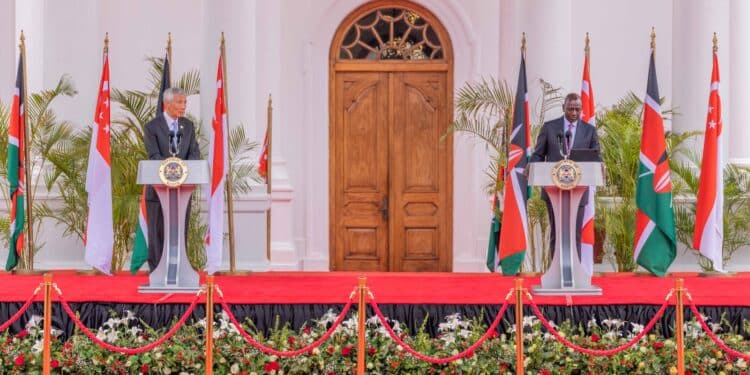On 23 September 2024, the Government of the Republic of Kenya and the Government of the Republic of Singapore signed a new Agreement for the Elimination of Double Taxation with respect to Taxes on Income and the Prevention of Tax Evasion and Avoidance (the DTA).
Should the DTA come into effect, it will replace the earlier double taxation agreement between the two countries dated 12 June 2018 that never came into force. The double taxation agreement that never came into force was signed on the same date as the bilateral investment treaty between both countries (the Bilateral Investment Treaty).
At the time, the two treaties were touted as being the key to unlocking investments between Kenya and Singapore with the Bilateral Investment Treaty safeguarding investments made in either country and such DTA providing for the taxing rights of the income inflows and outflows of both jurisdictions.
However, while the Bilateral Investment Treaty came into force on 20 August 2023, the terminated DTA was never ratified. While no official communication was provided, the delay in the ratification of the terminated DTA coincided with calls from advocacy groups for stringent vetting of double taxation agreements.
These calls were fueled by claims that some of the double taxation agreements that Kenya had entered into were lopsided and provided loopholes for aggressive tax avoidance.
For example, the terminated DTA provided for a withholding tax rate of 5% with respect to dividends paid by a Kenyan entity to a Singapore resident which was considerably low when compared to the standard non-resident withholding tax rate on dividends of 15% that applies to residents of countries that Kenya does not have a double taxation agreement with.
It is against the above backdrop that the DTA has been signed. It is hoped that the DTA together with the Bilateral Investment Treaty will accelerate the bilateral trade between the countries, which exceeded USD 180 million in the year 2023.
Double tax treaties clarify the taxation of cross-border income and establish a strong framework to prevent double taxation for both businesses and individuals who partake in transnational activities.
Key Provisions of the DTA between Kenya and Singapore:
- Reduced withholding tax rates
| Nature of payment | Standard non-resident rate where there is no DTA | Rate under the DTA |
| Dividends | 15% | 8% |
| Interest | 15% | 10% |
| Royalties | 20% | 10% |
| Technical Fee | 20% | 10% |
The reduced rates are only applicable where the beneficial owner of the relevant payment is a resident of the other contracting state (in this case Singapore).
The DTA does not define who constitutes a beneficial owner. The Organization for Economic Co-operation and Development (OECD) commentaries on the model articles define a “beneficial owner” as a person who has the right to use and enjoy the income.
In elaborating this point, the commentaries highlight that it would be erroneous to consider who is the beneficial owner of the underlying assets (i.e. shares) with respect to which incomes (i.e. dividends) are being paid.
Also Read: Countries Kenyans Can Travel to Without Visa
In light of the explanation by the OECD, agents and nominees are not considered to be beneficial owners since they are simply conduits for income and therefore treaty benefits would not be available to such persons.
Despite the clarification by the OECD, the Kenya Revenue Authority (KRA) would still likely seek to rely on the limitation of benefits (LOB) provision in the Kenyan Income Tax Act to preclude the application of the provisions of the DTA.
This would be by limiting the applicability of the DTA in instances whereby dividends are paid by a Kenyan resident person to a Singapore resident person and less than 50% of the underlying ownership of the Singapore resident person is held by persons who are not residents of Singapore.
As elaborated above, this reference to the beneficial owner of the assets would be against the international law position on the interpretation of the tax treaties.
-
Expanded definition of a permanent establishment intended to align with the provisions of the Income Tax Act
Most of the double taxation agreements that are in force in Kenya limit how a resident of the other state could crystallise a permanent establishment in Kenya.
However, the DTA provides for additional ways in which a resident of one state (for instance, in this case, Singapore) could crystallise a permanent establishment in the other state (Kenya).
The effect of a Singapore resident entity crystallising a permanent establishment in Kenya is that any income that would be generated by the permanent establishment in Kenya would be taxable in Kenya.
Pursuant to the DTA, a resident of Singapore would crystallise a permanent establishment in Kenya in the following ways:
- if such entity has a place of management, branch, office, factory, workshop, a mine, oil and gas well, or warehouse in Kenya;
- if such an entity has a building site, a construction, assembly or installation project or supervisory activity that lasts in Kenya for more than six (6) months;
- if the provision of consultancy services in Kenya through employees or consultants engaged by such an enterprise for that purpose but only if the activities continue for a period exceeding 183 days in a 12-month period;
- if such an entity carries on exploration or exploitation of natural resources in Kenya for periods exceeding 91 days in any 12-month period; and
- if such an entity has an installation or structure used in the exploitation of natural resources in Kenya and such an installation lasts for more than 91 days in any 12-month period.
Higher threshold in the DTA for the applicability of capital gains tax (CGT)
At the moment without the DTA being in force, the disposal of immovable property or shares by a Singapore resident would attract capital gains tax (CGT) in Kenya under the following circumstances:
- if the immovable property is situated in Kenya;
- if the shares are registered in Kenya;
The capital gains arising from the disposal of shares registered in another country (for instance Singapore) would still be taxable in Kenya if the shares derive 20% or more of their value from immovable property situated in Kenya or if the company is deemed resident in Kenya by virtue of its management and control being exercised in Kenya.
Pursuant to the DTA, the disposal of immovable property and shares by a Singapore resident would have the following tax implications in Kenya:
- Kenya would have the first right to tax the capital gains arising from the disposal of immovable property in Kenya;
- Singapore would have the first right to tax the capital gains arising from a disposal of shares and similar interests even though such interests may be registered in Kenya; and
- Kenya would have the right to tax the capital gains arising from a disposal of shares and similar interests situated in Kenya or another jurisdiction (in this case Singapore) if such shares or similar interests derive more than 50% of their value from immovable property situated in Kenya.
In this regard, the DTA provides that Kenyan CGT shall only be applicable on a transfer of shares in a Kenyan company or a non-Kenyan company if such shares derive 50% or more of their value from immovable property in Kenya. This is higher than the threshold of 20% as provided in the Kenyan Income Tax Act.

Elimination of the double taxation
The DTA provides that any tax paid in Singapore by a resident of Kenya shall be available as a deduction against the taxable income of such a person in Kenya.
However, the DTA provides that such a deduction shall not exceed the tax that would have been payable in Kenya if it were not for the deduction.
The limiting of the amount that a Kenyan resident could deduct ensures that a Kenyan resident does not end up in a refund position as a result of the deduction.
Also Read: How Kenyan Traders Will Benefit from Ruto’s UAE Deal
For a Singapore resident, the tax paid in Kenya shall be available as a credit against the tax payable in Singapore.
In addition, where the income earned by the Singapore resident is dividend income received from a Kenyan company in which the Singapore resident controls at least 10% of the share capital, the DTA provides that the tax credit shall include the corporation income tax paid on the income that the dividends are paid from.
Accordingly, the DTA is more advantageous for Singapore tax residents than Kenyan tax residents with respect to the elimination of double taxation.
The applicability of withholding tax on technical fees
The DTA provides for a specific article dealing with the taxation of technical fees. The term “technical fees” is defined to mean any fee paid for a service of a managerial, contractual, technical, agency, professional or consultancy nature.
In this regard, a Kenyan resident person would be required to deduct withholding tax at the rate of 10% when paying a Singapore resident in respect of any of the listed services.
Does the DTA make Singapore a suitable holding company jurisdiction?
While the DTA does make a case for considering Singapore as a holding company jurisdiction, other factors still make it less attractive when compared to other jurisdictions such as Mauritius or the United Arab Emirates.
Currently, Singapore resident companies pay corporate income tax at a flat rate of 17%. In addition, there is no capital gains tax (CGT) (typically applicable on transfer of shares) in Singapore and withholding tax is not applicable on dividends paid by a Singapore resident entity to a non-resident. In this regard, should a holding company be set up in Singapore to hold Kenyan entities, tax benefits would accrue as follows;
- Where dividends are paid by the subsidiary in Kenya to the holding company in Singapore from income that has been fully taxed in Kenya, there would be a credit for (a) the income (corporate) tax paid in Kenya at the rate of 30% on the income from which the dividends are paid and (b) the withholding tax applicable in Kenya on the dividends at the rate of 8% against the 17% corporation income tax in Singapore. Accordingly, no tax would be payable in Singapore;
- Where interest on loans is paid, there would be a credit of the 10% withholding tax paid in Kenya against the 17% corporation income tax in Singapore. Therefore, there would be a requirement to only top up tax of 7%; and
- Where royalties are paid by the subsidiary in Kenya to the holding company in Singapore, there will also be a credit of the 10% withholding tax paid in Kenya against the 17% corporation income tax in Singapore. Therefore, there would be a requirement to only top up a tax of 7%.
Trade Barriers
In addition, pursuant to the Bilateral Investment Treaty that came into force in the year 2023, Kenya and Singapore sought to ensure that there would be no hindrances to the movement of capital, profits, dividends, interest, royalty and payments between the two countries.
This was in addition to additional guarantees relating to fair treatment, safeguarding against national expropriation and mechanisms for compensation as a result of armed conflict and wars.
Notwithstanding the above-reduced withholding rates, the availability of tax credits in Singapore, and the existence of the Bilateral Investment Treaty, Singapore may still not be a suitable holding company jurisdiction due to the considerably higher corporation tax rate of 17% when compared to the 15% and 9% corporation tax rates that apply to companies resident in Mauritius and the United Arab Emirates respectively.
The effect of the 17% corporation tax rate would be that while dividends paid to a Singapore holding company would not be subject to further tax in Singapore, further tax would be applicable on interest, royalties and management and professional fees. This would not be the case were the holding company to be located in Mauritius or the United Arab Emirates.
In addition, (a) the lack of corresponding double taxation agreements between Singapore and neighbouring countries such as Uganda, Tanzania, Ethiopia, Rwanda, Burundi, and the Democratic Republic of Congo would make it less attractive for a holding company jurisdiction and (b) the administrative costs of having a holding company in Singapore including meeting applicable substance requirements may prove to be prohibitive.
Next steps to bring the DTA into effect
Pursuant to Kenya’s treaty ratification process, the DTA will be tabled for review in the Kenyan Parliament. The Kenyan Parliament will consider public input on the DTA in compliance with the requirement for public participation. The DTA is ratified by approval by the Kenyan Parliament.
Upon ratification, Kenya shall notify Singapore, and upon reciprocal ratification in Singapore, the signed and sealed instruments of ratification of the DTA shall be exchanged between the countries.
The DTA shall then be applicable from 01 January of the next calendar year following the exchange of the instruments of ratification. A gazette notice will also be published by the Cabinet Secretary for National Treasury, stating that the DTA shall have effect in relation to income tax in Kenya.
Conclusion
It remains to be seen whether the DTA will come into force. This is because it comes at a time when there has been increased scrutiny of the substantive clauses of the double taxation agreements to ensure that the benefits are not deemed to be lopsided.
In addition, we have noted instances whereby the Kenyan Government has signed double taxation agreements but not taken the necessary action to bring them into force as in the case with the new double taxation agreement with Mauritius and the double taxation agreement with Italy.
This article was written by Alex Mathini and Andrew Oduor, Partners, and Bernard Kirii, Associate, Bowmans Kenya.
Follow our WhatsApp Channel and join our WhatsApp Group for real-time news updates.











































































